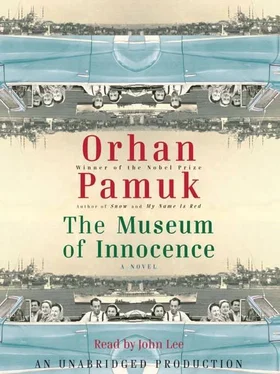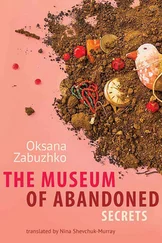55 Come Again Tomorrow, and We Can Sit Together Again
FOR EIGHT years, assuming no flood or snow had closed the roads, and he was not ill or on holiday, and the car was in good repair Çetin Efendi drove me to Füsun’s house in my father’s Chevrolet. I was careful not to break that rule. After the first few months he’d made friends in the local teahouses and coffeehouses. He would never leave the car right in front of the Keskins’ house, parking instead near those places with names like the Black Sea Coffeehouse or the Evening Teahouse; he’d go into one of these establishments and as he watched the same television program that we were watching at Füsun’s house, he would read the paper, join in the conversation and sometimes a game of backgammon, or watch the men playing a card game known as Konken. After the first few months, everyone in the neighborhood knew us both on sight, and unless Çetin Efendi was exaggerating, they thought of me as a humble man who faithfully visited his poor distant relations just for the pleasure of their company, and for the love they felt for him.
Over the eight years there were of course those who claimed I had dark and evil designs. There was idle gossip not worthy of serious consideration: I was there to buy all the ruined houses in the neighborhood for next to nothing, only to demolish them and build apartments; I was looking for unskilled laborers to work for a pittance in my factories; I was a deserter from the army; or I was Tarık Bey’s illegitimate child (which would make me Füsun’s older half brother). But the reasonable majority had deduced, from the bits of information that Aunt Nesibe judiciously dispensed now and again, that I was a distant relation of Füsun’s, involved in a film project with her husband that would make her a movie star. From what Çetin told me over the years, I understood that there was nothing unacceptable about these circumstances, and that even if the Çukurcuma neighborhood did not have any particular affection for me, as a rule they looked favorably on me. In any event, by the second year they had come to see me almost as one of their own.
It was a mixed neighborhood: Galata dockworkers, clerks and owners of small shops in the backstreets of Beyoğlu, Romany families who had moved there from Tophane, Kurdish Alevi families from Tunceli, the impoverished children and grandchildren of the Italians and Levantines who had once worked as clerks in Beyoğlu or Bank Street, a handful of the old Greek families who, like them, still could not find it in them to leave Istanbul, and various employees of bakeries and depots, taxi drivers, postmen, grocers, and penniless university students. This multitude did not coalesce into the sort of united community one saw in the traditional Muslim neighborhoods of Fatih, Vefa, and Kocamustafapaşa. But from the help I was continually offered, from the interest the young men took in any unusual or expensive cars that cruised its streets, from the speed with which news and gossip spread through the neighborhood, I inferred a sort of connectedness, a tentative solidarity, or at the very least the buzz of shared experience.
The house in which Füsun’s family, the Keskins, lived was on the corner of Çukurcuma Avenue (popularly known as Çukurcuma Hill) and the narrow lane known as Dalgıç Street. As you can tell from the map, it was a ten-minute walk through the neighborhood’s steep and winding streets to Beyoğlu and İstiklal Avenue. Some evenings, on our way home, Çetin would take those winding streets up to Beyoğlu, and sitting in the backseat smoking a cigarette I would gaze inside the houses and the shops and at the people on the sidewalks. Lining these narrow streets were dilapidated wooden houses, overhanging the sidewalks as if on the verge of collapse, and vacant buildings abandoned by the latest wave of Greeks immigrating to Greece; these, and the stovepipes that the impoverished Kurdish squatters in those same buildings stuck through their windows, gave night a fearsome guise. Even at midnight, neighborhoods near Beyoğlu were still alive with small, dark bars, meyhanes , cheap nightclubs that described themselves as “drinking establishments,” snack bars, grocery shops that sold sandwiches, lottery shops, tobacconists where you could also buy narcotics, black market cigarettes, or whiskey, and even music shops selling records and cassettes, and though all these places were in miserable condition, they struck me as cheerful and lively. Of course, I would only feel this way if I had left Füsun’s house in a peaceful frame of mind. There were many nights when I left the Keskin household thinking that I would never go back again, and, revolted by the ugliness of the hurly-burly street, as Çetin drove the car I would lie down miserably on the backseat, as if passed out. Most unhappy evenings of this order date back to the early years.
Çetin would pick me up from Nişantaşı a little before seven in the evening; we’d run into a bit of traffic in Harbiye, Taksim, and Sıraselviler, and then wind our way through the backstreets of Cihangir and Firuzağa, passing in front of the historic Çukurcuma Hamam as we rolled down the hill. Somewhere along the way I would ask Çetin to stop the car and buy a package of food or a bunch of flowers. Not every time I visited, but on average every other time, I would bring a funny little present for Füsun-some Zambo Chiclets, a brooch or a barrette decorated with butterflies that I had found in Beyoğlu or the Covered Bazaar-and I would give it to her very lightheartedly, as if it were half a joke.
Some evenings, to avoid the traffic, we would go via Dolmabahçe and Tophane, turning right onto Boğazkesen Avenue. Without fail throughout that eight-year period, every time we turned onto the Keskins’ street, my heart would begin to race just as it had done when as a child I turned in to the street where my school was, and I felt a disquiet in which joy mingled with panic.
Having tired of paying rent for an apartment in Nişantaşı, Tarık Bey had used his savings to buy the building in Çukurcuma. The Keskins’ apartment entrance was on the first floor. They also owned the little ground-floor apartment, and over the eight years a series of tenant families drifted in and out like ghosts, never involving themselves in our story. The entrance of this small apartment (which would later become a part of the Museum of Innocence) was on the side street- Dalgıç Street -and so I rarely crossed paths with the people who lived there. I did hear that Füsun had befriended one of the tenants-a girl named Ayla, who shared the apartment with her widowed mother while her fiancé was doing his military service-and that they’d go together to the cinema in Beyoğlu, but Füsun hid her neighborhood friends from me.
During the first months, when I rang the doorbell at Çukurcuma Hill, it was always Aunt Nesibe who would descend the flight of stairs to let me in. In all other instances, even if the doorbell rang in the evening, she would always send Füsun down. This was her way of making it clear to me that from my very first visit everyone knew why I was there, and for that purpose she was my natural mediator. But there were times when I felt as if Feridun really didn’t suspect a thing. As for Tarık Bey, living as he did in a world of his own, he never gave me much cause for concern.
In the same spirit, Aunt Nesibe always took it upon herself to say something to make my presence seem natural as soon as she opened the door. Her conversation starters were usually inspired by whatever they were watching on television: “A plane was hijacked. Did you hear about it?” “They’re showing pictures of the bus crash and they’ve left out none of the horror.” “We’re watching the prime minister’s visit to Egypt.” If I arrived before the news, Aunt Nesibe would always say with the same conviction: “Oh wonderful, you’re just in time. The news is just beginning!” And sometimes she’d add, “We’ve made those cheese pastries you like so much,” or “This morning Füsun and I made some lovely vine-leaf dolmas , you’re going to love them.” If her chatter to diffuse the situation seemed too forced, I would feel ashamed and remain silent. But most of the time I would cheerily reply, “Is that so?” or “Oh wonderful, just in the nick of time,” and go upstairs repeating the rejoinder with exaggerated enthusiasm when I saw Füsun, hoping to hide the shame and joy I felt at that moment.
Читать дальше












